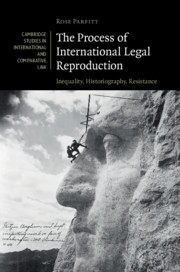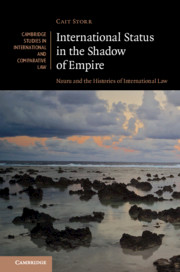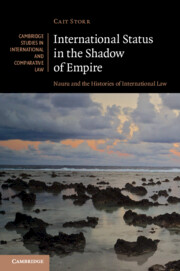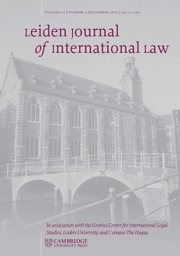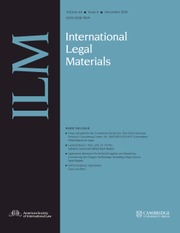The Process of International Legal Reproduction
That all states are free and equal under international law is axiomatic to the discipline. Yet even a brief look at the dynamics of the international order calls that axiom into question. Mobilising fresh archival research and drawing on a tradition of unorthodox Marxist and anti-colonial scholarship, Rose Parfitt develops a new 'modular' legal historiography to make sense of the paradoxical relationship between sovereign equality and inequality. Juxtaposing a series of seemingly unrelated histories against one another, including a radical re-examination of the canonical story of Fascist Italy's invasion of Ethiopia, Parfitt exposes the conditional nature of the process through which international law creates and disciplines new states and their subjects. The result is a powerful critique of international law's role in establishing and perpetuating inequalities of wealth, power and pleasure, accompanied by a call to attend more closely to the strategies of resistance that are generated in that process.
- Draws on radical historiographical, legal, linguistic and anti-colonial theory to create a new methodological framework that challenges some of the key assumptions underpinning the contemporary international order
- Engages with some of the international order's most pressing concerns, from escalating civil conflict to global warming to the struggle for indigenous self-determination on indigenous terms
- Mobilises a new archive of primary materials gathered in Addis Ababa, Rome, Geneva and London to explore the legal dynamics of oppression and resistance, from the Ethiopian Empire's efforts to resist fascist annexation to anticolonial struggles ongoing for more than four centuries
Reviews & endorsements
‘What a wonderfully engaging and important book this is. Out of a sophisticated, non-dogmatic Marxist perspective on international law and history, Rose Parfitt develops an analysis of the fundamental inequality of the international legal system by a complex reading of the Italian invasion of Abyssinia in the 1930s and the treatment of the matter by the Great Powers and the League of Nations in Geneva. Including the perspective of the Ethiopians themselves and situating the events in the larger history of Western power and on military and diplomatic manoeuvres in the 'Orient', she constructs the most inspired - and inspiring - postcolonial study of modern statehood and international law that I have read.' Martti Koskenniemi, University of Helsinki
‘Parfitt’s The Process of International Legal Reproduction is a major event in international legal scholarship - at the levels of historical methodology, critical theory, and archival research. In lucid and persuasive prose, Parfitt synthesizes the broadest range of critical approaches, ranging from heterodox Marxism and post-colonial theory to materialist linguistics and aesthetic modernism - yielding a thoroughly original conception of ‘modular’ historiography. Her case-studies, above all her magisterial analysis of the ‘Abyssinia Crisis’ of the late 1930s, are based not only on meticulous treatment of often previously unexamined documents, but on a perspectival presentation of them in accordance with her theoretical conception. The book is a monumental achievement that should decisively shape the field for years to come, compelling a rethinking of the basic categories of international legal doctrine, historiography, diplomacy, and resistance.’ Nathaniel Berman, Rahel Varnhagen Professor of International Affairs, Law, and Modern Culture and Religious Studies, Brown University
‘In this remarkable book, Rose Parfitt offers us an entirely new way both to understand ostensibly familiar legal processes of state formation, and to write the history of those processes. International legal reproduction describes of the way existing states usher new subjects of international law into being and subject them to discipline, political, fiscal, and military. Scanning half a millennium, Parfitt explores the terms new subjects must meet even to qualify, and the prerogatives claimed by those according them conditional 'sovereign' legitimacy. Multiple case studies, including a detailed history of the 'Abyssinia Crisis' of the 1930s, put demonstrative flesh on these macrohistorical bones. This is an unapologetic call for revisionism in both the substance and method not just of international law but also of legal history, and a trenchant demonstration of the advantages that will accrue.’ Christopher Tomlins, Elizabeth Josselyn Boalt Professor of Law, University of California, Berkeley
Product details
February 2019Hardback
9781316515198
534 pages
235 × 159 × 27 mm
0.98kg
11 b/w illus. 4 maps
Available
Table of Contents
- Stand: conditionality and sovereign inequality
- Frame: history as shadow-box and the process if international legal reproduction
- 1. The 'Abyssinia Crisis' and international law
- 2. State colony, individual: the Longue Durée of international legal reproduction
- 3. International legal reproduction and the League of Nations
- 4. Empire des Nègres Blancs: the emergence of the Ethiopian empire as a subject of international law
- 5. Interpellation and resistance: Ethiopia and the allure of the League
- 6. Reconnecting the crisis
- Lid: discipline, resistance and the process of international legal reproduction today
- Sources.

